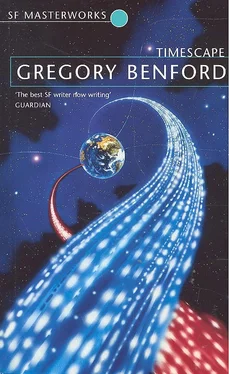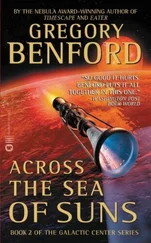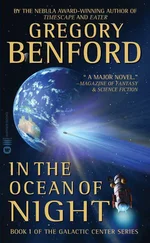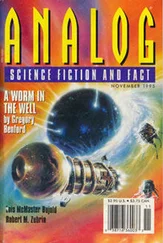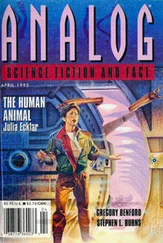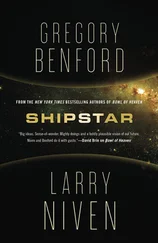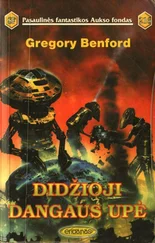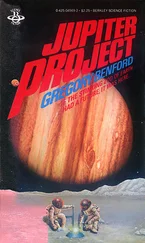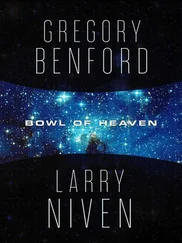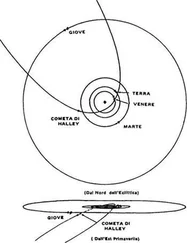Dyson was slim and humorous, moving gracefully before the blackboard as though in a light trance, thinking hard about what he wanted to say and bending each sentence to strike a precise point. He had been very careful earlier to correct George Feher when he was referred to as “Doctor.” Dyson had never finished his doctorate and now seemed slightly proud of it, with the Englishman’s pride at being, at least in the formal sense, an amateur. But there was nothing amateurish about Dyson’s Colloquium. His slides were neat, with clear graphics, some in color. They had the professional aerospace finish that to Gordon underlined the pleasant perks of prosperity; in his undergraduate days at Columbia, rough sketches and hand-lettered slides were universal.
Dyson described his years of work on Project Orion, a plan to propel huge spacecraft by exploding nuclear bombs behind them. The blast would strike a “pusher plate,” which would transfer the muted kick through shock absorbers to the ship itself. The idea at first seemed like a Rube Goldberg design, but as Dyson spoke it became plausible. The only way to ferry truly large payloads around the solar system was through nuclear drives of some kind. Orion was basically simple and used what we were already good at: making efficient bombs. Why not use man’s destructive capability for something useful? Dyson thought that a strong effort would not simply put men on the moon by 1970—Kennedy’s goal—but beyond, all the way to Mars. The principles involved had been tried in small-scale experiments and they worked. The problem, of course, was the first stage: lifting the craft from the earth’s surface on a stuttering trail of nuclear blasts.
“Won’t you plaster us with radioactive debris?” a voice from the Colloquium audience called.
Dyson pursed his lips. He was a compact man and his sharp features seemed to pin the problem like a butterfly. “Much less so than the atmospheric tests we and the Soviet Union are now conducting. We calculate Orion would add no more than one percent to the level of radiation that politics—” he pronounced the word carefully—“already sets for us.”
At this point Dyson became wistful, as though he could sense Orion slipping from him. The newspapers brought daily reports of agreements on the Nuclear Test Ban; Washington rumor said it would be signed within months. If so, even Orion’s small dose of radioactives would be ruled out. Toward the end of the hour, after the equations and graphs, there came a bittersweet quality. History would pass Orion by. It might someday fly above the atmosphere, once men had a safe way to get it into orbit with chemical rockets. But even then, much of the debris would eventually find its way down into the air. Maybe there was no completely safe way to harness our gift for making bombs. Maybe there were no shortcuts to the planets.
The applause which greeted Dyson’s somber conclusion was prolonged. He bowed tentatively toward his audience, smiling with sad eyes.
• • •
Gordon gave the last Colloquium of the year. The audience was even larger than Dyson’s of the week before, and noisier. Gordon opened with details of the experiment, history of the field, slides of the normal resonance lines. He had compiled all Cooper’s conventional results to date, and showed how these confirmed the usual theory. It was a satisfactory but relatively unexciting discussion. Gordon had considered leaving matters at that—no reference to the messages, no risks. But something made him cut short the parade of slides. He murmured, “However, there are some unusual features in the noise observed in our work”—and he was off, describing the interruptions of Cooper’s resonance curves, their suspicion that a pattern lay underneath, then the first decoding. Gordon used the viewgraph projector, sliding the transparent sheets into view as he spoke, his sentences coming quicker now, the words more clipped, a certain momentum coming into his voice. He showed the breakdown of the first message. He discussed the chances that such a message could be a fluke, an accident. From the crowded room there arose a sustained murmur. He described their efforts to track down a local source for the noise, their failure, and then the second message. Gordon made no mention of Saul and the 29-by-53 grid; he simply displayed the data. The RA 18 5 36 DEC 30 29.2 chart filled an entire viewgraph. Only then did Gordon mention “spontaneous resonance,” giving Isaac Lakin full credit for the term and the idea. He kept his face blank and his voice flat and calm as he described “spontaneous resonance,” gave the statistical probability of such an effect arising from random noise, and left the rows of RA 18 5 36 DEC 30 29.2 on the viewgraph as mute testimony. In dry, precise tones he told of their precautions against outside signals, of the waxing and waning of the “spontaneous resonance”—now he used the term archly, pausing before and after the words as if to put verbal quotation marks around them, smiling very slightly—and he paced back and forth before the blackboards, trying to remember the measured way Dyson had done it, head tilted down.
The voice came out of the audience. Before the first sentence was finished, heads turned to see the speaker. It was Freeman Dyson. “You realize, I suppose, that Saul Shriffer has made much of this? Of 99 Hercules?”
“Ah, yes,” Gordon said, stunned. He had not seen Dyson in the crowd. “I, I did not authorize him to…”
“And that no one at 99 Hercules could possibly be responding to our commercial radio stations yet? It is too far away.”
“Well, yes.”
“So if this is a message from there, they must be using communication faster than light?”
The auditorium was silent. “Yes.” Gordon hesitated. Should he back up Saul’s idea? Or stand pat?
Dyson shook his head. “I spoke last week about a dream. It is good to dream—but be sure to wake up.”
A wave of laughter came down from the crowd and broke over Gordon. He stepped backward two paces without thinking. Dyson himself looked surprised at the reaction, and then smiled down from his position halfway up the bowl-shaped auditorium, his face softening as he looked at Gordon, as though to blunt the edge of his remark. Around Dyson others were slapping their knees and rocking back and forth in their seats, as though something had unleashed a tension in them and now, with a sign from Dyson, they were sure of how to react.
“I don’t propose…” Gordon began, but was drowned out by the continuing laughter. “I don’t…” He noticed Isaac Lakin standing, a few seats from the front and to the left. Eyes in the audience turned from Gordon to Lakin. The laughter died.
“I would like to make a statement,” Lakin said, voice booming. “I invented the idea of spontaneous resonance to explain unusual data. I did so completely honestly. I think there is something happening in these experiments. But this message thing—” he waved a hand in dismissal. “No. No. It is nonsense. I now disclaim any association with it. I do not want my name linked with such, such claims. Let Bernstein and Shriffer make what they want— I do not cooperate.”
Lakin sat down decisively. There was applause.
“I don’t propose to decide what this means,” Gordon began. His voice was thin and it was hard getting the words out. He peered at Dyson. Someone was whispering to Dyson and smiling broadly. Lakin, Gordon noticed, was sitting with arms folded across his chest, glaring down at the RA and DEC. Gordon spun and looked at the coordinates looming above him, large and flat and remorseless.
“But I think it’s there.” He turned back to the crowd. “I know it sounds funny, but…” The buzzing in the audience kept on. He coughed, and could not seem to summon up the booming confidence that Lakin had used. The crowd noise got louder.
Читать дальше
